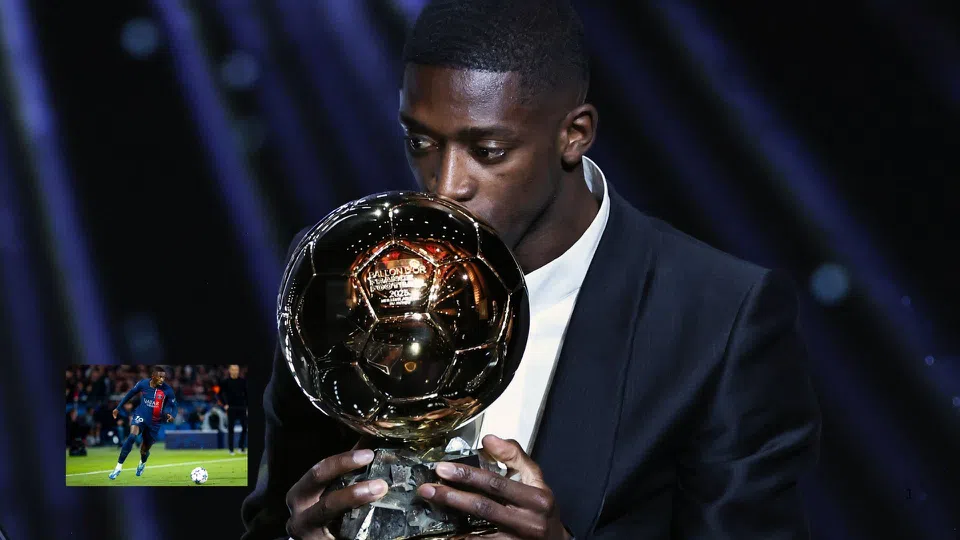The Ballon d’Or 2025 controversy did not end when the lights dimmed at the Theatre du Chatelet in Paris, it only intensified. As Ousmane Dembele held the golden sphere that crowned a season of silverware in Paris Saint-Germain colors, Zlatan Ibrahimovic added a booming voice to an already lively debate about whether Barcelona’s teenage phenomenon Lamine Yamal was the true standout of the year.
Dembele’s triumph capped a season defined by end product and collective glory. The French forward scored 35 goals and delivered 16 assists as PSG swept the UEFA Champions League, Ligue 1 and the French Cup, a clean sweep that placed him on the highest pedestal of the game. In the voting, he finished with 1,380 points, a margin that speaks to overwhelming trust in his consistency and decisive moments across the campaign.
Yamal, who finished second with 1,059 points, represented a very different kind of story, youthful audacity meeting elite execution. Barcelona’s brightest spark helped deliver a domestic treble, and his performances carried the aesthetic of genius that makes people lean forward in their seats. He also collected the Kopa Trophy for best under 21 player, a nod to how quickly and completely he has taken to the top level.
Zlatan Ibrahimovic makes the case for Yamal
Ibrahimovic, never shy about calling football as he sees it, made his stance clear during an appearance at the Trento Sports Festival. He distilled a season’s worth of arguments into one sharp line that struck a chord across the football world.
You have to judge the player who made the difference individually. For me, Yamal did.
He echoed the same point in comments referenced by Italian media, stressing that Yamal’s individual brilliance merited the ultimate prize. For a teenager to move an icon like Zlatan is telling, and it underscores how Yamal’s artistry has become a beacon for a generation that values creativity as much as efficiency.
How Dembele won the vote
There is a straightforward argument for Dembele, and it begins with the most elemental metric in modern football, impact on trophies. PSG, powered by his pace and precision, claimed the Champions League and a domestic double, which gave voters a clear narrative of decisive performances in the biggest matches. The numbers formed a persuasive proof, 35 goals, 16 assists, and a stream of defining contributions for a team that dominated on multiple fronts.
Dembele also carried the emotional weight of that journey. On stage in Paris, he admitted that individual awards were never the objective, he said he fought to win the Champions League for the team. That simple message added a human dimension to the statistical accomplishment, humility married to excellence, and it resonated with those who saw his year as a story of relentless, team centered ambition.
Why Yamal inspired the counter narrative
Yamal’s case is rooted in the transformative power of individual genius. Week after week, he was the accelerant for Barcelona’s attack, a teenager bending games to his rhythm and lifting a historic club to a domestic treble. For those who prioritize the eye test, the tape of his season offered a highlight reel that felt like a manifesto for artistry.
That is why Ibrahimovic’s test, judging who made the difference individually, resonated so strongly. It did not dismiss Dembele’s trophies, rather it challenged the lens through which we define best, and whether the Ballon d’Or should tilt toward the player who authored more moments of singular brilliance, even if he finished runner up in the vote.
A night of winners in Paris
The ceremony itself told a broader story about the modern game and who is shaping it. Dembele became the sixth French player to win the Ballon d’Or, and the first since Karim Benzema in 2022, a landmark that places his name alongside the nation’s finest. Spain’s Aitana Bonmati extended her era, earning the women’s Ballon d’Or for a third consecutive year and celebrating a night that expanded recognition for the women’s game.
PSG’s dominance was recognized beyond Dembele. The club was named Men’s Club of the Year after amassing 48 wins and 168 goals last season, a tally that reflects sustained excellence. Luis Enrique received the men’s best coach honor, Gianluigi Donnarumma was named men’s best goalkeeper, and Viktor Gyokeres finished as top scorer, a constellation of accolades that framed PSG’s year as a benchmark.
On the women’s side, the breadth of recognition widened. Sarina Wiegman was named best coach, Hannah Hampton received the best goalkeeper award, and Ewa Pajor earned top scorer honors. Arsenal was crowned Club of the Year, another signal that investment and identity in the women’s game is yielding an increasingly competitive landscape.
Barcelona’s youth movement and recognition
Barcelona’s future shone brightly in Paris. Yamal’s Kopa Trophy confirmed a second straight season where he stood as the game’s most exciting youngster, and club teammate Vicky Lopez collected the women’s Kopa Trophy, underscoring the depth of emerging talent at La Masia. The message, clear and compelling, Barcelona’s next generation is already shaping the present.
Such recognition matters beyond the podium. It affirms a pathway for players who value development and responsibility at a young age, and it validates a philosophy that trusts youth with pressure. For many voters and fans, that is part of Yamal’s allure, potential unfolding in real time, with maturity that belies his age.
How the criteria conversation keeps evolving
The debate around this Ballon d’Or crystallized an old argument, trophies and output versus individual difference and style. Dembele’s season aligns with a metric driven view of the game, counting the goals and assists that lead to silverware. Yamal’s season appeals to the sensibility that the award should capture the player who made people gasp and opponents hesitate, the artist whose influence felt larger than numbers alone.
Neither perspective is wrong, and this is why the conversation has persisted with such energy. It is also why Ibrahimovic’s verdict, grounded in individual difference, hit a nerve, and why many neutrals nodded along. The vote separated them by 321 points, but the global court of opinion remains very much in session.
What others around the game are saying
Ibrahimovic’s view was not isolated. The sentiment echoed the stance of Xavi Hernandez, who had argued earlier that Yamal outperformed Dembele across the season and deserved the crown. That position reflected a coaching eye that values the player who bends a match toward his will, especially in the tightest contests.
There was also a human note from a rival superstar. Kylian Mbappe urged critics to give Yamal space and privacy, a reminder that even while the spotlight burns brightest, the players living under it are young men navigating pressure that can be as intense as any defender’s tackle. In a year of soaring performances, that call for empathy was a welcome counterbalance.
The emotion behind Dembele’s moment
When Dembele spoke in Paris, there was a quiet sincerity to his words. He insisted this trophy had not been his goal, that he chased the Champions League for the team, and the award arrived as a byproduct of collective success. The humility complemented the hardware, and it painted a portrait of a player who has sharpened his game without losing sight of the dressing room.
That tone matters in a sport that often reduces legacies to highlight reels and medals. Dembele’s balance of contribution and character, backed by the numbers that define elite production, offered voters a complete package. For many, that was enough to put him ahead when pens met paper.
Yamal’s resilience and silver lining
Second place in the Ballon d’Or will sting for a competitor wired to win everything. Yet walking away with the Kopa Trophy for a second consecutive season is its own measure of dominance at youth level. The honor signals not just promise, but realized excellence that forced the senior conversation long before most teenagers are ready for it.
For Barcelona supporters, the night carried pride and anticipation in equal measure. If this is what Yamal looks like now, the imagination runs wild about what comes next. That is the hope at the heart of the counter argument, the belief that the best player in the world might already be here, learning, growing, and taking notes from every setback.
A ceremony that broadened the stage
The 2025 gala further widened the lens on who gets celebrated. New categories on the women’s side, including best goalkeeper, best scorer and best young player, turned the spotlight onto performers whose brilliance merits dedicated recognition. It was a statement of progress and parity, and it added layers of meaning to a night that already means so much to players and fans.
Bonmati’s words captured the mood, a belief that a long push for equality has found real traction. When icons speak about fairness and opportunity from the same stage as the men’s winners, it changes the texture of the conversation. It also affirms that the Ballon d’Or stage can be both a celebration and a platform.
Key takeaways from the vote
- Dembele’s clean sweep with PSG aligned achievement and statistics,
- Yamal’s artistry convinced influential voices that the award should reflect individual difference,
- The 321 point gap in voting did not settle the public debate.
The wider context of legacy
The Ballon d’Or has been a compass for greatness since 1956, and every year reignites a question that has no single answer, what does best really mean. For some, it is the player who lifts the biggest cup, for others, it is the one who most consistently turns balance into advantage and chaos into control. That ambiguity keeps the award alive long after the ceremony.
In 2025, that ambiguity had names and faces. Dembele, the champion whose season tallied goals, assists and titles. Yamal, the prodigy whose performances left an imprint that felt larger than a box score. Put together, they gave us a season worth arguing about, which is another way of saying it was a season worth remembering.
Remembering the human moments
The night in Paris also paused to honor the broader football family. A tribute video remembered Portugal forward Diogo Jota, who died in a car accident in July, and it brought a hush to a room otherwise full of applause. The ceremony’s aura can be glamorous, but on nights like this, it carries tenderness too.
That balance between spectacle and sincerity mirrors the players we celebrate. They chase perfection with the world watching, then carry the weight of life’s truths once the lights go down. The Ballon d’Or remains powerful because it touches both sides of the game, the glory and the gratitude.
What this means for PSG and Barcelona
For PSG, the haul of trophies and individual awards confirms a structure and a style that have come together at the right time. The club’s global ambitions were made tangible by nights in Europe and in Paris, and the Ballon d’Or stage turned that narrative into a photograph. It is a benchmark that invites a new target, sustained dominance at home and abroad.
For Barcelona, the message is hope through development. With Yamal and Vicky Lopez recognized among the best young players in the world, the club’s strategy of trusting youth feels validated. The urgent task is to convert promise into more senior level titles, which is precisely the challenge that sharpens great teams.
The debate will outlive the ceremony
Ibrahimovic’s verdict will ripple through every corner of the game where fans meet to argue and dream. It will fuel discussions in press rooms, on training grounds and across living rooms that orbit the sport. That is the beauty of football’s grandest individual stage, it invites conviction and counterpoint in equal measure.
Dembele’s name is engraved on the trophy, and nothing can change that. Yet the conversation around Yamal’s claim is proof that the Ballon d’Or is more than a vote tally, it is a barometer of what we value when we watch a ball move across a field. In 2025, the answer depended on which heartbeat you listened to.
Closing thought
The award year gave us clarity on one point, greatness wears many faces. Dembele offered the relentless production of a champion, Yamal offered the electricity of a prodigy, and both made this Ballon d’Or season unforgettable. If that is controversy, football could use more of it.






